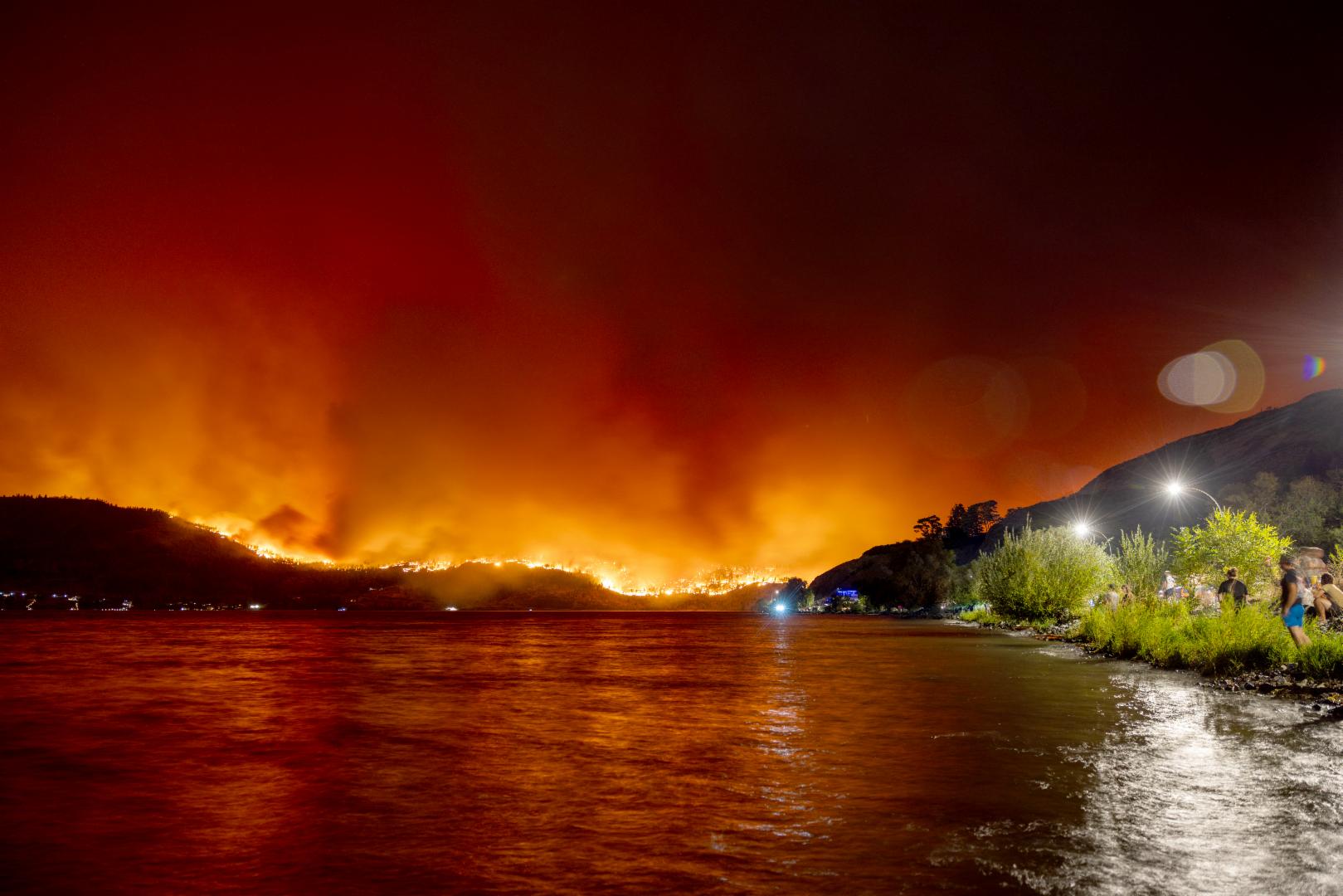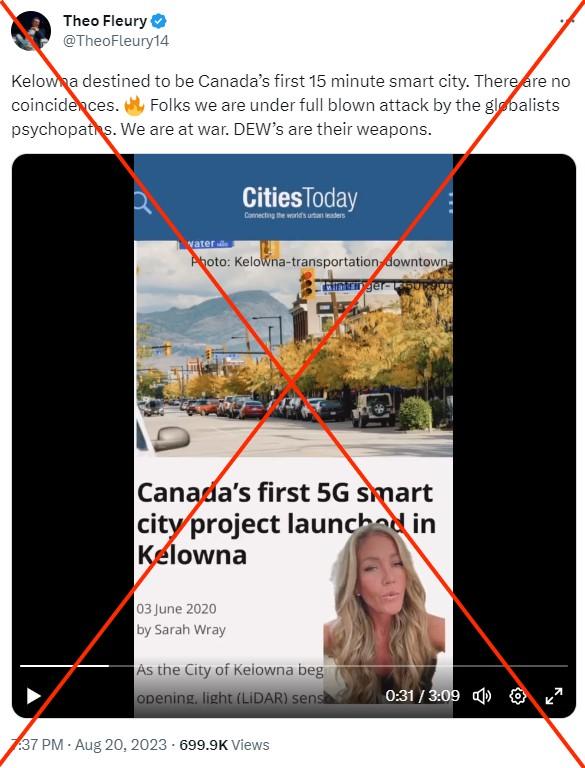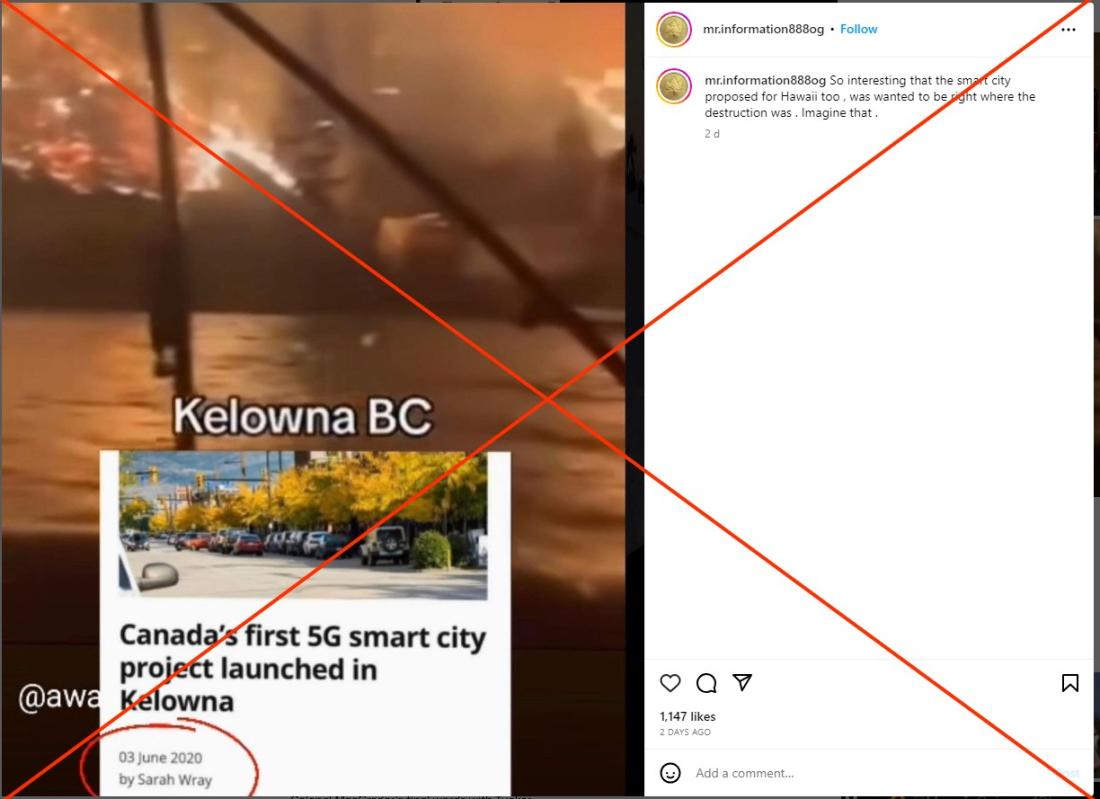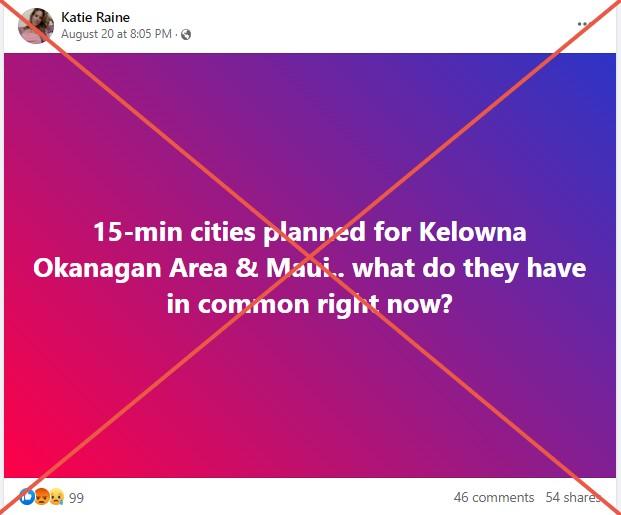
British Columbia wildfires spark unsupported city planning conspiracy theories
- This article is more than two years old.
- Published on August 25, 2023 at 20:03
- 4 min read
- By Gwen Roley, AFP Canada
"Kelowna destined to be Canada's first 15 minute smart city," says former hockey star Theo Fleury, who has previously promoted misinformation, in an August 20, 2023 post on Twitter, which is being rebranded as "X."
"There are no coincidences. Folks we are under full blown attack by the globalists (sic) psychopaths."
Fleury's post includes a video in which a speaker claims August wildfires in Canada and the US state of Hawaii were planned to target areas slated to become 15-minute cities, referencing a conspiracy theory that AFP has previously debunked.
"So what are the odds that we have two fires, in two places, within a week's time and both of these places have initiatives to become smart-intelligent cities, governed and ran by AI?" the speaker says in the clip, which also circulated on Facebook and TikTok. "It is literally the implementation of 15-minute cities."

Other users on Facebook, X and Instagram have shared similar claims that the fires near Kelowna -- which resulted in the evacuation of more than 30,000 people -- were set to force people into 15-minute cities, smart cities or a combination of the two.


The posts are the latest to allege without evidence that Canada's record-breaking 2023 wildfire season is the result of coordinated arson. From Alberta to Quebec to the Northwest Territories, officials have previously told AFP that while the blazes' causes are under investigation, foul play is not suspected.
This is also the case with the August inferno in British Columbia.
Nicole Bonnett, a fire information officer with BC Wildfire Service, said the flames could be "human-caused" -- but that does not automatically mean arson.
"They effectively fall into two overarching categories," she said in an interview on August 22. "One is natural and one is human-caused, and human-caused doesn't necessarily mean that it was intentional or mal-intended, just that some sort of human activity led to the fire starting."
Bonnett said there have been efforts to suppress the wildfire adjacent to Kelowna. But windy, dry conditions strengthened the blazes, forcing crews to pull back for safety.
"The cold frontage that swept across the province came with some really significant winds, and the wind in combination with existing drought codes is what caused the fire to grow that large," she said.
No 15-minute city mandate
As evidence to support their claims, the social media posts cite a local news article about 15-minute cities (archived here) and screenshots with information about Kelowna's "intelligent city" initiative (archived here).
Many of the posts conflate smart and 15-minute cities, two different urban planning frameworks that have previously been the subject of misinformation.
A 15-minute city is a design concept aimed at ensuring citizens' needs can be met within a short walk or bike ride from their homes. Ryan Smith, Kelowna's divisional director of planning and development services, said the government has no such mandate.
"There may be overlap with 15-minute city philosophy as it's understood by the planning industry, but it's not specifically referenced in any of planning documents," Smith told AFP on August 23.
He said once evacuation orders are lifted, Kelowna's planning department will support residents and neighboring municipalities in reconstruction efforts.
Kelowna's smart city plan
Kelowna does have a smart city plan aimed at leveraging "online services, technological innovation and collaborative problem-solving, creating local solutions to local problems," according to the municipal government website (archived here).
But Andreas Boehm, Kelowna's intelligent cities manager, told AFP smart cities do not involve displacing people -- the technologies are more of an "add-on" that people can choose to engage with.
For example, the city recently started testing an artificial intelligence chatbot programmed to clarify municipal construction codes.
"The smart city thing is thought of as a city that's using sensors and data -- that's been happening forever," Boehm said, referencing a project to monitor intersection traffic for possible improvements.
He said his team is looking to use data to solve complex problems, but "we're not removing or ripping things up."
Much criticism about smart cities revolves around data security and the possibility for external companies to access citizens' information, a key issue attributed to the failure of a project involving Google in Toronto.
Kelowna has already partnered on projects with corporations including Microsoft and Canadian telecommunications giant Rogers, as well as academic institutions in the province. Boehm said he tries to dispel concerns by being transparent about the city's projects and working with the Montreal AI Ethics Institute.
"I think it's important that we're always communicating, that we may not always have the answers, but that these are our principles and this is what we're planning on doing with it," he said.
More of AFP's reporting on misinformation in Canada is available here.
Copyright © AFP 2017-2026. Any commercial use of this content requires a subscription. Click here to find out more.
Is there content that you would like AFP to fact-check? Get in touch.
Contact us
